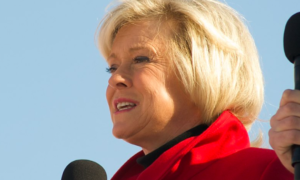 Sue Barker, broadcaster and the face of the BBC at Wimbledon, is finally retiring, after 30 years on the job.
Sue Barker, broadcaster and the face of the BBC at Wimbledon, is finally retiring, after 30 years on the job.
It ’ s hard to imagine Wimbledon without her and difficult to think who could fill her shoes. Sue is knowledgeable, incredibly natural, with a great sense of humour, all of which make for a brilliant broadcaster and interviewer. She is also seen as strongly maternal by many of the players – her on-court interview with a devastated and tearful Andy Murray after his loss to Roger Federer in the 2012 Wimbledon final, for example, was handled with enormous tact and kindness
But you don ’ t get to be such a success without grit — and an element of ruthlessness.
I first came across Sue when she came onto the scene around the age of 14 at the Junior Grass Court Championships in Eastbourne, where she was touted as the next big thing.
She absolutely walloped that flat forehand for winner after winner. I once saw her down in a tie-break by 5-0. Undaunted, she followed up by seven pulverising forehands in a row to take the set.
I had first-hand experience of that completely overwhelming stroke when we played one another at Junior Wimbledon. It was quite a long walk from the clubhouse to the court and I tried to make friendly conversation along the lines of: “ Nice day, isn ’ t it?” She looked grimly ahead, avoiding all eye contact or any attempt at conversation. She was “ dialled in”, as they say. I felt hopelessly amateurish and rather stupid.
Booming forehand after booming forehand sailed past me – she got to 5-0, 30-0 and I hadn ’t won a point and a large crowd was gathering. I won the next point, the crowd erupted and I raised my arms aloft. Sue slammed a ball into the stop netting. She was furious that she hadn’ t “ bagelled ” me and I was quite shocked at her reaction. I settled down after that and lost by a fairly respectable 6-2 6-3. There was a running joke between us for years after that. Every time we saw one another she ’ d say: “ I played this terrible girl at Junior Wimbledon. I can ’ t remember her name.” On reflection, it wasn ’ t all that kind.
But when she started playing Senior Wimbledon, she always got me into the players ’ lounge and sometimes into the players ’ box on Centre Court — which was pretty generous and much appreciated.
Sue Barker is fêted above all for her broadcasting work. However, it ’ s not widely known to the average tennis fan that she actually won the French Open in 1976 at the age of 20. And the following year, when Virginia Wade won Wimbledon, Sue got to the semi-finals. She lost in a strangely disjointed encounter with the Dutch player, Betty Stove, in a match she could definitely have won. If she ’ d won that semi, she could well have beaten the famously nervy Wade in the final to take that coveted Wimbledon title. Barker beat Stove the following week in a minor tournament, something she ’ s frequently alluded to over the years. It clearly still torments her. It ’ s a sad fact that in later years most sportspeople tend to lament their failures rather than savouring their successes.
I bumped into Sue at Queen ’ s a few years ago, where she was covering the Wimbledon warm-up event. “ Hello Sue ,” I said. A look of panic crossed her face. She clearly didn ’ t recognize me. Well, why should she after not seeing me for thirty years? “ I was just telling my friends about how you slaughtered me at Junior Wimbledon.” “Oh, but you were a good player, though,” she countered. Well retrieved — and what professionalism! I didn ’ t fall for it, but my friends did, so I suppose that counted for something.
Sue will surely be sorely missed by TV audiences, players and all those who ’ ve worked with her over the years. But as she leaves the limelight, Sue Barker should also be celebrated as a great former player, a tough competitor and Grand Slam winner.
